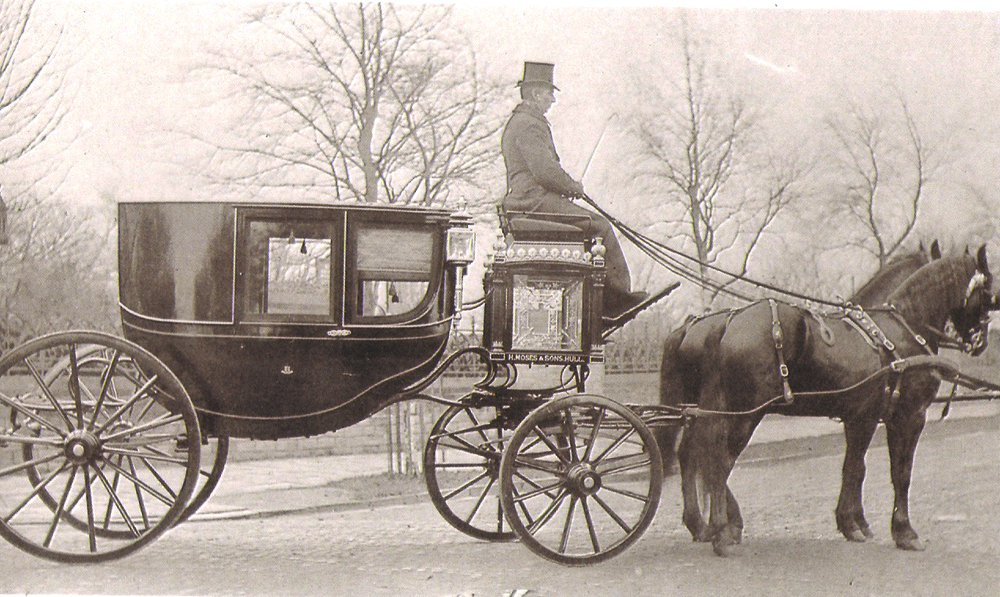Averil Edith Thomas: Home and Family Life [Part 1 of 2]
A huge part of Averil Edith Thomas’ memoir is based on her home and family life. She references childhood anecdotes on nearly every page of her autobiography, and it is clear that her family were immensely important to her. There is a raw sense of love and support for one another that seems to have remained with her throughout her life.
In the opening of her memoir, Averil states how ‘it has been said that one’s earliest recollection is always of some shock or other’ (2). Her first memory recalls an incident where her life was saved by her siblings after a horseman ‘lost control of his stead’ (2). The horse and carriage came catapulting towards them, but she was snatched out of her pram before the horse hit. The children were returning home at the time of the incident, after delivering a picture frame to one of their father’s clients. Upon discovering later that Averil’s pram was broken, her brother and sister pondered the question, ‘What would mother say?’ (2). However, the children were quick to remember that her mother had forever said ‘safety was always the most important’ (3).

This small introductory anecdote is important as it helps to communicate the family’s relationship with one another to the reader. By sending the children to deliver his work, Averil’s father is displayed as a working-class man trying to make ends meet by accepting any possible help from his family. The story also indicates how the siblings were closely bonded, as Nancy and Will worked together to save the life of their younger sister in the absence of their parents. In addition, the importance of Averil’s safety to everyone involved expresses how health and wellbeing were the most important priorities in life.
However, the most interesting aspect of Averil’s memory is the children’s apprehension: ‘What would mother say?’, as it reveals the gender dynamics that are apparent within Averil’s household. Throughout Averil’s memoir, small tales of family trips and childhood mischief often resulted in the same thought. This leaves space to question why their father’s opinion was never regarded by the children, and why he was only mentioned within her autobiography in relation to his work rather than to the family. Their mother appears to hold more power and influence over Averil and her siblings in a seemingly patriarchal society.

During Averil’s childhood memoir (although unspecified is estimated to be from 1893 to 1910) women, like her mother, were typically restricted to the household whilst men dominated the workplace. It was only after the First World War in 1914 that these gender restrictions began to loosen, as women proved they could perform ‘male’ jobs when all men were fighting at war. Before this however, women were given little respect outside the domestic realm, and were solely judged based on the upbringing of their children and their ability to run a household. This work was also not regarded as proper labour.
Laura Schwartz writes about The Domestic Workers’ Union of Great Britain, stating;
‘Such work (cooking, cleaning, and caring) took place in the private sphere of the home, [re]producing people rather than commodities, and is therefore frequently defined as ‘non-productive’. 174-175
The Domestic Workers Union was set up to represent women who worked in a domestic environment in order to try to gain the social and political respect they deserved. These women were labelled by society as ‘unproductive’, when in reality they were the opposite. Reproducing children and raising them as substantial members of society can be considered as a greater benefit to the country than the reproduction of ‘commodities’. This gendered binary between the household and workplace is especially evident within lower class households like Averil’s, where the father would spend all of his time and energy working in order to earn money for the family to survive, with little left to spend with his family. This explains how although external society followed the rules of patriarchy, the internal environment within the home was very much matriarchal.

Averil’s household is undoubtedly shaped by gender; particularly highlighted through the description of her brother’s death. Her brother had ‘gone boating on a river with a pal’ (17) at the age of sixteen, but when the boat capsized he was unable to swim and sadly drowned. Averil states that this ‘nearly resulted in a nervous collapse for my mother’ (17), and she was later portrayed as still ‘not very well’ (23). As a result, their mother’s friends provided ‘beautifully cooked and arranged trays of dinner’ (23) for the family, as she was noticeably unfit to cook. The death of Will clearly had an effect on her mother’s health, but the father is yet again not mentioned in connection to the family’s issues. With Averil’s mother struggling with grief, it is other women who help to care for Averil’s family rather than the father. This portrays him as somewhat disconnected emotionally with the family in comparison to their mother, although it may reflect the behaviour of men as a whole rather than his own persona, as it simply was not their role within the family to deal with such things.
[continues on to ]
Sources
Averil Edith Thomas, untitled, pp.26 (c. 6,500 words), Burnett Collection of Working Class Autobiography, Brunel University Library. No 1:892
Laura Schwartz, The Domestic Workers’ Union of Great Britain and Ireland 1908–14, Twentieth Century British History, Vol. 25, No. 2, 2014, pp. 173–198
Images
http://www.britishdrivingsociety.co.uk/images/History%20gallery/pictorial_history.htm
http://getns.weebly.com/life-in-the-19th-century.html

Leave a Reply